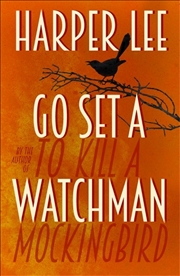 Why I won’t be reading Go Set a Watchman.
Why I won’t be reading Go Set a Watchman.
I have been watching the reviews of Watchman and waiting for someone to call a spade a spade, but the first reviews were insipidly, mildly positive, only commenting on the shock to readers that Atticus Finch, now 72, has turned racist.
Anyone taking an interest in how the manuscript was ‘found’ and the present life of Harper Lee must have smelt a rat, or to use a current turn of phrase, it doesn’t pass the sniff test. We know that Harper Lee is elderly, deaf and with diminishing eyesight. We know she lives quietly in Monroeville, the town on which To Kill a Mockingbird’s Maycomb is based, and has lived there since the 60s. We know that Lee has not given interviews over the years and that Lee had a protective sister, Alice (a lawyer), who died last year.
We also know that the manuscript for Watchman was ‘found’ in a safety security box a few years ago along with Lee’s will.
It is also evident that had Harper Lee wanted to publish Watchman she could have done so at any time in the last 50 years and she would have then been able to rewrite, revise etc. Obviously, given that the depiction of Atticus (reportedly based on her father) would have been hurtful, she may have been loath to do so, yet, also obviously, she was prepared to publish in the late 50s when she presented the manuscript to a literary agent.
At the time of first writing Watchman Lee was living in New York – a young woman trying to make her way as a writer in the big smoke and, we can assume, attempting to break away from her roots in Monroeville at a time of the growing civil rights movement.
 After the phenomenal success of Mockingbird, Lee retreated from public life and returned to live quietly in Alabama.
After the phenomenal success of Mockingbird, Lee retreated from public life and returned to live quietly in Alabama.
From all accounts Watchman is not a polished work but retains many of the hallmarks of a draft novel.
What writer would be happy to have a preliminary novel published without the chance to revise? It is also reported that Lee did not want anything changed on the manuscript.
One may ask oneself, who wins from this publication? Not Lee and her reputation as a novelist. She must already be a wealthy woman and so would not need the money. The novel reportedly is critical of Monroeville, albeit, in the 60s, yet Lee still lives there, and is now embroiled in the controversy that has arisen from the novel.
As they say, follow the money trail.
Of course a lot of people will read Watchman out of curiosity but if you are going to spend your money on a novel why, oh why, not spend it on the hundreds, thousands, of other brilliant novels out there by new, emerging or mid-career novelists. Yes, I know the argument that when multinational publishers (HarperCollins in this instance) have a bestseller, it fills their coffers and they can then support (take a punt on) new writers. I’ll counter that with, when a reader buys a book that is hyped up and they are then disappointed with it, they may not be willing to buy another.
I am not sorry that Watchman has been shown the light of day. It is important for literary scholars and, as many have said, it does give a fascinating insight into the antecedence of To Kill a Mockingbird and how rewriting and ‘re-envisaging’ can work so well.
The best review I have read so far is by Robert McCrum in The Guardian http://www.theguardian.com/books/2015/jul/19/go-set-watchman-harper-lee-review-literary-curiosity.

